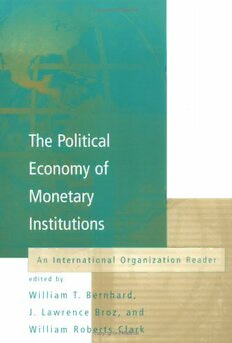
The Political Economy of Monetary Institutions (International Organization Special Issues) PDF
233 Pages·2003·0.943 MB·English
Most books are stored in the elastic cloud where traffic is expensive. For this reason, we have a limit on daily download.
Preview The Political Economy of Monetary Institutions (International Organization Special Issues)
Description:
Recent analysis by political economists of monetary institution determinants in different countries has been limited by the fact that exchange rate regimes and central bank institutions are studied in isolation from each other, without examining how one institution affects the costs and benefits of the other. By contrast, the contributors to this volume analyze the choice of exchange rate regime and level of central bank independence together; the articles (originally published in a special issue of International Organization) constitute a second generation of research on the determinants of monetary institutions. The contributors consider both economic and political factors to explain a country's choice of monetary institutions, and examine the effect of political processes in democracies, including interest group pressure, on the balance between economic and distributional policy.
See more
The list of books you might like
Most books are stored in the elastic cloud where traffic is expensive. For this reason, we have a limit on daily download.
